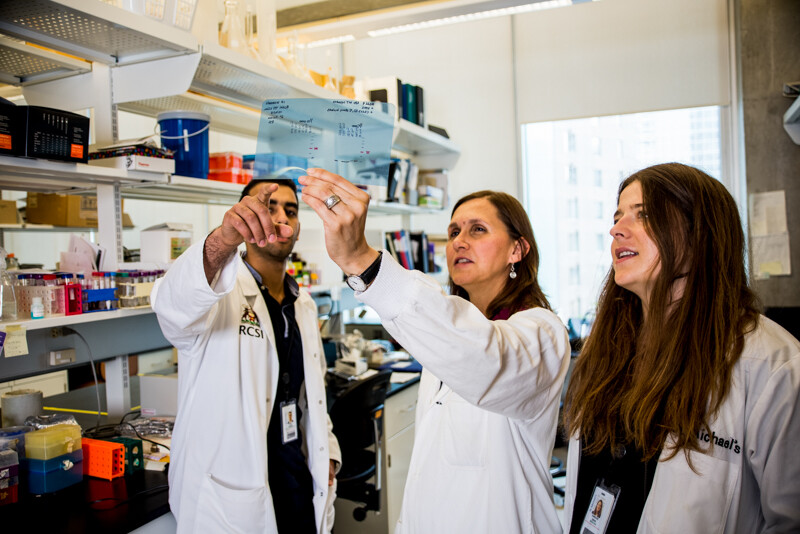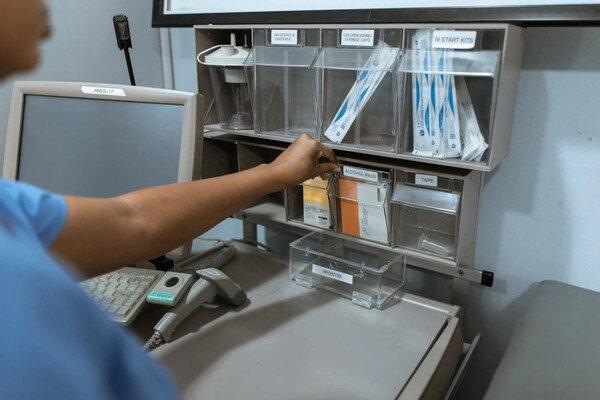Main Second Level Navigation
- Welcome
- Why Toronto?
- History of the Department
- Vision & Strategic Priorities
- Our Leadership
- Our Support Staff
- Location & Contact
- Departmental Committees
- Department of Medicine Prizes & Awards
- Department of Medicine Resident Awards
- Department of Medicine: Self-Study Report (2013 - 2018)
- Department of Medicine: Self-Study Report (2018 - 2023)
- Communication Resources
- News
- Events
Research Autonomy and Project Support: Results from the 2017 Faculty Survey

Dr. Gillian Hawker
Some of the top medical research in the world is being conducted by faculty in the Department of Medicine. The research they produce at the basic science and clinical levels is improving patient health and outcomes, and is changing healthcare and medicine tremendously at local and global levels. How our faculty view at their own roles as researchers, however, is something that was important for us to capture in the 2017 faculty survey.
As part of the faculty survey, we posed five key questions related to research. These questions looked at:
- Perceived autonomy over respondents’ research focus
- Satisfaction with their level of autonomy over their research focus
- Perceptions of whether their research contributions were valued (such as by the U of T DOM Chair/Vice Chairs, U of T division director, primary hospital PIC, primary hospital division director, research institute and colleagues)
- Satisfaction with support for individual research projects
- Satisfaction with salary support for research
Key Themes
A number of key themes emerged around autonomy and project support for our faculty members who are conducting research, including clinician scientists and clinician investigators, ranging from levels of satisfaction with autonomy to how their research is valued and supported. This can be broken down into the following four key themes that emerged out of the faculty survey:
1. Autonomy over Research Foci and Level of Satisfaction with Autonomy
Of the 342 respondents, more than half (66.1%) acknowledged that research was part of their academic position or work profile. Most respondents (91.0%) perceived that they had a high level of autonomy over the focus of their research, and I’m glad to say that the vast majority (91.4%) were either somewhat or strongly satisfied with this level of autonomy.
2. Level of Agreement Regarding Whether Research Contributions are Valued by Various Individuals
A number of the respondents strongly or somewhat agreed that their research contributions were valued by the U of T DOM Chair/Vice Chairs (48.8%), their U of T division director (59.5%), primary hospital PIC (66.9%), and especially by their primary hospital division directors (70.6%) and colleagues (71.3%). Notwithstanding, we identified broad variation in responses related to whether research institutes valued research contributions with similar proportions of respondents disagreeing (33.9%), expressing neutrality (24.9%) or agreeing (41.2%) with a statement that their research contributions were valued by research institutes.
3. Satisfaction With Support for Individual Research Projects
Although most respondents expressed being somewhat or strongly satisfied with industry support for individual research projects, many expressed feeling dissatisfied with the support received from external peer review agencies (47.5%), the DOM (46.5%) and their research institutes (54.5%). Nearly a third of respondents expressed being dissatisfied (37.9% and 38.8%) or satisfied (35.1% or 35.5%) with the support offered by the AFP Innovation Fund and their hospitals, respectively, for research projects.
4. Satisfaction With Salary Support
Many of the respondents to the faculty survey reported that they were dissatisfied with salary support from national grant agencies (39.5%), but were more satisfied with the financial support they received through their hospital practice plans (53.2%). Respondents were neither satisfied nor dissatisfied with the support they received from international and provincial grant agencies and professional societies, and their satisfaction varied with regard to the DOM Merit Award (26.3% were dissatisfied, 36.8% were neutral and 36.9% were satisfied).
In subgroup analyses, though clinician investigators expressed similar sentiments as their clinician scientist counterparts regarding satisfaction with their level of research autonomy, clinician scientists were more likely to agree with statements that their work was valued by others. Clinician scientists were also more satisfied with the funding available to conduct research projects from multiple sources (with the exception of industry), and more satisfied with salary support received from multiple sources, especially hospital practice plans.
Summary of what we’ve learned
Overall, respondents expressed a high level of autonomy and satisfaction with their autonomy over their research foci. The largest disconnect for valuing research was with our research institutes. Approximately half of our respondents were dissatisfied with project support from grant agencies, the DOM and research institutes. Most respondents were dissatisfied with salary support from national grant agencies, but they were satisfied with the financial support they received through their hospital practice plans. Though clinician investigators (vs. scientists) expressed similar levels of autonomy and satisfaction with their level of autonomy over their research focus, they also expressed feeling that their work was less valued by multiple individuals and being less satisfied with access to funds to support individual research projects and themselves as researchers.
Five recommendations
- There needs to be inherent ‘value’ for researchers in belonging to a research institute. That is, we need to do a better job of informing our researchers how they can access resources at the research institutes and centres affiliated with our department. We need to ask ourselves if this might include harmonizing salary supports (such as Merit awards) with resources that are necessary and available to be productive. We also need to ensure clinician investigators have access to the resources that they need to be successful.
- More on that point, clinician investigators need to better supported and have better access to resources, including recognition, training, salary support and awards.
- The needs of research community need to be better addressed with emphasis on increasing ‘outside’ sources of financial support and enhancing the profile of all researchers from the novice to the experienced researcher.
- Strategies need to be developed, such as through implicit bias training, to address potential sources of bias on research grants and awards committees to ensure transparency and address issues related to equity and diversity upfront.
- Work needs to be done with DOM networks to enhance access and availability of seed funding to enable quality improvement and pilot work, and promote collaborations within the DOM.
And of course, we need to celebrate and publicize our successes to fully recognize our research faculty. I want to hear about the research that is coming out of our department so we can share these success and get the word out!
Thanks to Drs. Karen Burns and Michael Farkouh for their contributions to this column.



